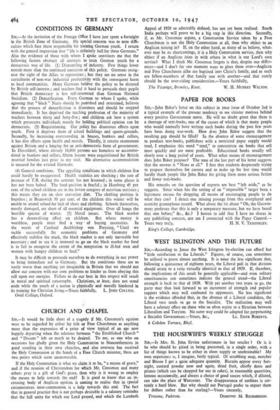CHURCH AND CHAPEL
Sta,—It would be little short of a tragedy if Mr. Crossman's opinion were to be regarded by either lay folk or Free Churchmen as anything more than the expression of a point of view typical of an age now happily departing when the relations between "the Established Church" and " Dissent " left so much to be desired. To me, as one who on occasions has gladly given the Holy Communion to Nonconformists in good standing in their own churches, and also overseas has received the Holy Communion at the hands of a Free Church minister, there are two points which seem unanswerable.
If the Holy Communion is what we claim it to be, "a means of grace," and if the reunion of Christendom for Which Mr. Grossman and many others pray is a gift of God's grace, then why is it wrong to employ the means to help towards the end? It is good to know that an in- creasing body of Anglican opinion is coming to realise that in rpecial circumstances inter-communion is a help towards this end. The fact that in general practice that is not perhaps desirable is a salutary reminder that the full unity for which our Lord prayed, and which the Lambeth
Appeal of 1920 so admirably defined, has not yet been realised. South India perhaps will prove to be a big step in this direction. Secondly, if, as Mr. Crossman argues, a Communion Service taken by a Free Churchman is not the Holy'Communion at all, then why object to an Anglican joining in? If, on the other hand, as many of us believe, what-. ever may be its shortcomings, it is a Holy Communion service, then why object if an Anglican joins in with others in what is our Lord's own service? What I think Mr. Grossman forgets is that, despite our differ- ences—and I don't for one moment want to gloss them over—Anglican and Free Churchmen alike are baptised into Christ's family, and as such are fellow-members of that family one with another—and that surely should be the over-riding consideration.—Yours faithfully,


































 Previous page
Previous page